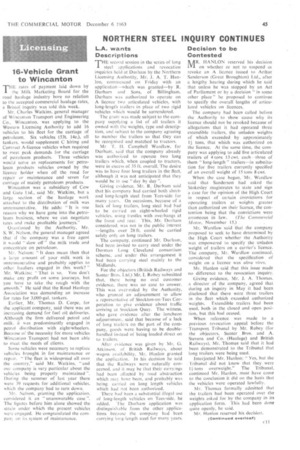NORTHERN STEEL INQUIRY CONTINUES
Page 47

If you've noticed an error in this article please click here to report it so we can fix it.
L.A. wants Descriptions THE second session in the series of long steel applications and revocation inquiries held at Durham by the Northern Licensing Authority, Mr. J. A. T. Hanlon, commenced on Friday with an application—which was granted—by R. Durham and Sons, of Billingham. Durham was authorized to operate on A licence two articulated vehicles, with long-length trailers in place of two rigid vehicles which would be surrendered.
The grant was made subject to the company supplying a list of all trailers it owned with the weights, type and description, and subject to the company agreeing to number the trailers so that they can be recognised and matched to tractors.
Mr_ T. H. Campbell Wardlaw, for Durham, said that the company already was authorized to operate two long trailers which, when coupled to tractors, were in excess of 35 ft. overall. The desire was to have four long trailers in the fleet, although it was not anticipated that they would be in use " day by day ".
Giving evidence, Mr. R. Durham said that his company had carried both shortand long-length steel from Tees-sidc for many yeaN. On occasions, because of a lack of long trailers, long steel had had to be carried on eight-wheeled rigid vehicles, using trestles with overhangs at the front and rear. This, Mr. Durham considered, was not in the public interest —lengths over 28 ft. could he carried safely only on long trailers.
The company. continued Mr. Durham, had been invited to carry steel under the Dorman Long Cleveland consortium scheme, and under this arrangement it had been carrying steel mainly to the Midlands.
For the objectors (British Railways and Smiler Bros. Ltcl.) Mr. I. Robey submitted that, there being no oral customer evidence, there was no case to answer. This was over-ruled by the Authority, who granted an adjournment to allow a representative of Stockton-on-Tees Corporation to give evidence about traffic arriving at Stockton Quay. The witness, who gave evidence after the luncheon adjournment, said that because of a lack of long trailers on the part of the company, goods were having to be doublehandled instead of being loaded direct on to trailers.
After cs idence was given by Mr. G. Atkinson, of British Railways, about wagon availability, Mr. Hanlon granted the application. In his decision he said that the Railways were naturally concerned. and it may be that their carryings had heen affected by road abstraction which may have been, and probably was being. carried on long length vehicles which had not been authorized.
There had been a substantial illegal use of long-length vehicles on Tees-side, he added. The Durham application was distinguishable from the other applications because the company had been carrying long-length steel for many years.
Decision to be Contested mR. HANLON reserved his decision on whether or not to suspend or revoke an A licence issued to Arthur Sanderson (Great Broughton) Ltd., after a lengthy hearing during which he said that unless he was stopped by an Act of Parliament or by a decision "in some other place" he proposed to continue to specify the overall lengths of articulated vehicles on licences.
The company had been called before the Authority to show cause why its licence should not be revoked because of allegations that it had operated three extendible trailers, the unladen weights of which exceeded by approximately 11 tons, that which was authorized on the licence. At the same time, the company was applying to add five articulated trailers of 4 tons 13 cwt. each —three of them " tong-length " trailers—in substitution for five trailers currently specified of an overall weight of 15 tons 8 cwt.
When the case began, -Mr. Wardlaw said that Sanderson had asked the Stokesley magistrates to state and sign a case for the opinion of the High Court in respect of certain convictions for operating trailers at weights greater than authorized on their licence, the contention being that the convictions were erroneous in law. (The Commercial Motor, November i5.) Mr. Wardlaw said that the company proposed to seek to have determined by the High Court whether the Authority was empowered to specify the unladen weight of trailers on a carrier's licence. The company, Mr. Wardlaw continued, considered that the specification of weight on a licence was ultra vire.v,
Mr. Hanlon said that this issue made no difference to the revocation inquiry.
Giving evidence, Mr. J. A. Thomas, a director of the company, agreed that during an inquiry in May it had been disclosed that there were three trailers in the fleet which exceeded authorized weights. Extendible trailers had been used, both in the closed and open position, but this had ceased.
When reference was made to a previous revocation appeal before the 'Transport Tribunal by Mr. Rohey (for the objectors, Sunter Bros. and A. Stevens and Co. (Haulage) and British Railways), Mr. Thomas said that it had been demonstrated to the Tribunal that long trailers were being used.
Interjected Mr. 1-lahlon: Yea, hut the Tribunal' did not know that they were 11 tons overweight." The Tribunal, continued Mr. Hanlon, must have come to the conclusion it did on the basis that the vehicles were operated lawfully.
Mr. Thomas formally admitted that the trailers had been operated over the weights asked for by the company in its application form. This had been done quite openly, he said.
Mr. Hanlon reserved his decision.




























































































































